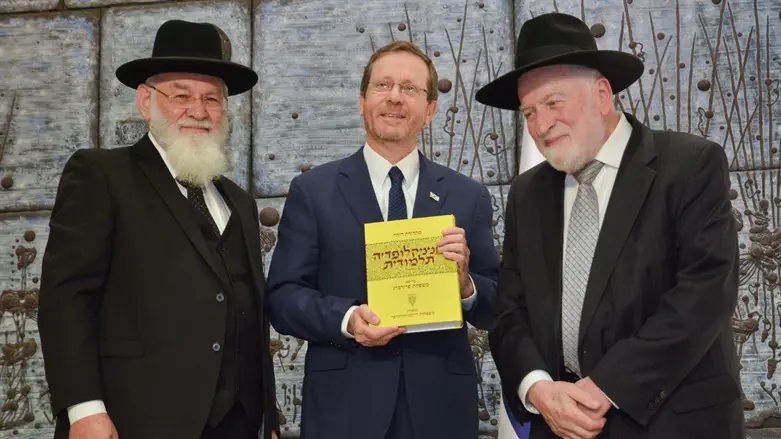
President Isaac Herzog recently hosted a special event to mark the release of a new edition of the writings of his grandfather, Rabbi Yitzhak Eizik HaLevi Herzog ztz"l, as well as the publication of a jubilee edition of the Encyclopedia Talmudica. Israel National News attended the festive event and posed the question: "What would Rabbi Herzog have said about the disputes of our day?"
The Encyclopedia Talmudica project was initiated in 1942 and the first volume was published five years later, in 1947. The project was greatly encouraged by Israel's first Ashkenazic Chief Rabbi, Rabbi Yitzhak HaLevi Herzog, and the English-language edition is named in his honor.
At the special event held at the President's official residence, Benny Gur, the adviser on the Encyclopedia Talmudica project, characterized the occasion as one that "showed the President of Israel giving honor to the Torah of Israel." He also cited the deep personal connection felt by the President with the personage and works of his grandfather. The director of the Encyclopedia Talmudica project, Rabbi Professor Avraham Steinberg, noted that the event celebrated both the publication of thirteen volumes of Rabbi Herzog's writings (including one volume of halachic responsa, Heichal Yitzchak) and the fiftieth volume of the Encyclopedia Talmudica.
The latest volume of the encyclopedia has been dedicated to Rabbi Tzvi Hershel Schachter, dean of Yeshiva University and the halachic adviser to the OU kosher certification agency.
Rabbi Shlomo Beeri, head of the Darchei Mishpat Institute, who edited the volume of Rabbi Herzog's responsa, noted that he had acquired the handwritten glosses of Rabbi Ovadia Yosef ztz"l, written on the sides of the pages of Rabbi Yosef's own edition of the responsa, and had incorporated them into the new printed edition.
Mike Herzog, the president's brother, described the special sense of excitement on the occasion. "Rabbi Herzog was a unique and exceptional personality, a giant in Torah learning, a spiritual leader, and also a person who achieved great things," he said.
Asked for his thoughts on what Rabbi Herzog would have said to the problems of today's day and age, Rabbi Steinberg said that he would not presume to speak in Rabbi Herzog's name, but in his opinion, "He would have wanted for there to be as many laws and regulations as possible guided by the spirit of halachah [Jewish law]. He always tried to align his actions with halachah, along with the recognition that times have changed and that we now have a state that didn't exist for two thousand years. He exerted great efforts in this direction. I think that if he had been here with us today, he would have been of immense help in finding solutions to problems that people have given up on."
Ashkenazic Chief Rabbi David Lau added that in his own times, Rabbi Herzog had to deal with conflicts between halachah and the state, each side pulling in the opposite direction. "Today, we view Rabbi Herzog as a unifying figure, but it would be wonderful if instead of waiting for things to change in the future, we began to follow in his ways today. Rabbi Herzog was devoted to the Torah and did not budge from adhering to it, to the letter. Indeed, he showed us that it is possible to do so and I suggest that anyone who wishes to know how should open his books and see that it's already all there."
Rabbi Beeri noted that in both his writings and his deeds, Rabbi Herzog outlined what he felt was the correct relationship between Torah and state. "I believe that if he were here, we wouldn't be in the mess we are," he said. "In his sefer Chukah Le'Yisrael, we can see how he succeeded in linking the two. If he were here today, he would succeed in fixing many things - and there's plenty that needs fixing."
Benny Gur then stressed the great privilege the State of Israel has as they approach the completion of the Encyclopedia Talmudica, an initiative that was begun during the Holocaust years by Rabbi Meir Bar Ilan and Rabbi Shlomo Zevin, who feared that the immense loss of lives would lead to a loss of knowledge. "This provides a message of unity for us all, so important in this day and age," he said.
Attorney Yoram Hagai Hajbi added that the Encyclopedia provided a way for anyone, even a non-religious person, to experience the immense wisdom of the Oral Law. "There's nothing new today - ethics are the same ethics, it's just that the manner of implementation has changed."
